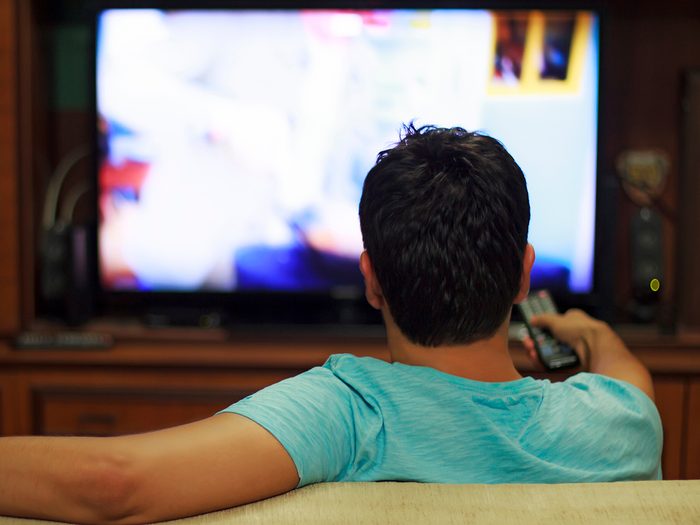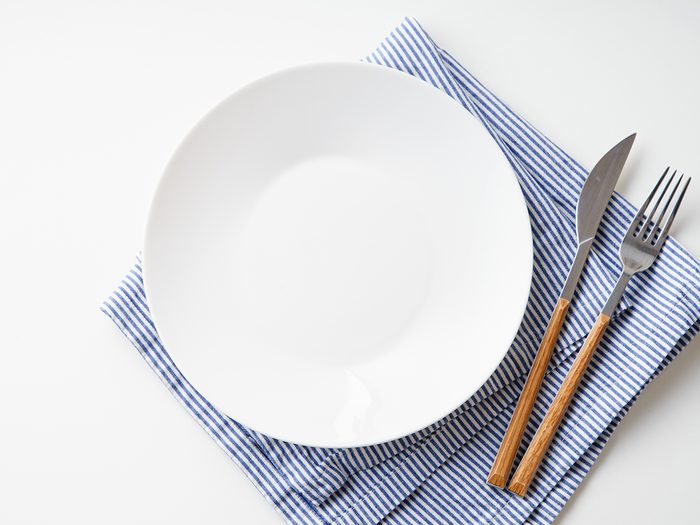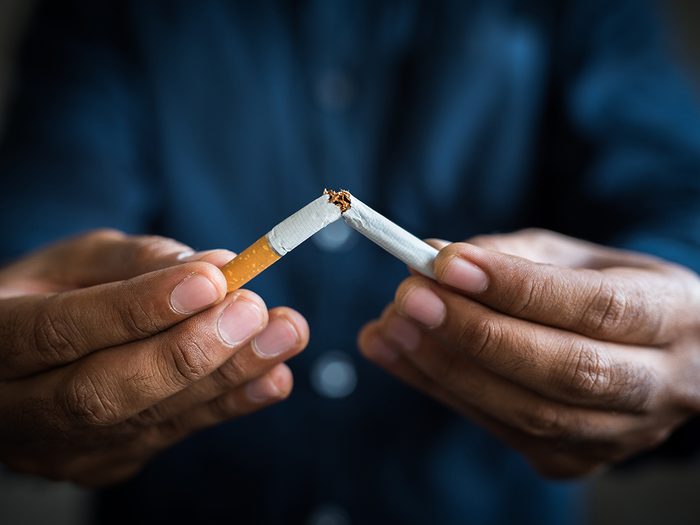
Bad Habits to Quit
Snacking non-stop, even when you’re not hungry
Why It’s Dangerous
Losing touch with your body’s natural hunger and satisfaction signals can lead to chronic overeating and unhealthy extra pounds that can lead to diabetes, heart disease, and other serious conditions. If it’s junk foods you snack on, you’re also flooding your body with unhealthy ingredients.
Why You Should Stop
With determination, anyone can fix bad eating habits, and get to a healthier, more natural weight. By paying attention to your hunger signals and switching to healthy snacks, you can boost nutrition, control cravings, lose weight, and avoid energy slumps. Your weight will fall to a healthier level, and you’ll replace unhealthy trans and saturated fat, sugar, refined carbohydrates, and extra sodium with more nutritious fare. (Here’s what can happen to your body when you eat too much salt.)
Reverse the Habit
- Reacquaint yourself with hunger: Wait to eat until your body is physically craving food.
- Stop eating before you’re stuffed: Finish when you feel just a little bit full, you’ll eat less this way.
- Eat for the right reason: Because you’re hungry—not because you’re stressed, bored, angry, or sad.
- Stop mindless eating: If snacking is an old, bad habit, ban unhealthy food from your home.
- Replace junk food with real food: Once you’ve cleared your pantry, stock your kitchen with fruits, veggies, nuts, and low-fat, whole-grain products.
- Plan snacks like you do meals: Eat your healthy snack on a plate, with a glass of water, and sit down at the table to enjoy it.

Spending too much time on the couch watching TV
Why It’s Dangerous
The more TV you watch, the less physical activity you’re getting, increasing your odds of being overweight and developing type 2 diabetes. A large-scale study of over 9,000 people found that those who watched more than two hours of TV a day ate more, while downing more sugary soft drinks and high-fat, high-calorie, processed snack foods than those who watched less. If television is replacing time you’d spend on an old hobby, visiting friends, or exercising your mind, it can also speed up memory loss.
Why You Should Stop
By turning TV time into active time and committing to a healthy TV/activity balance, you can burn more calories, become more fit, and reduce your odds for related health problems quickly. You’ll have a fitter body and more time for sleep, plus more energy, a better mood, sharper mind, and more social connections, which can even help you increase your self-confidence.
Reverse the Habit
- Follow the 2/30 rule: That means no more than 2 hours of TV a day—and at least 30 minutes of exercise.
- Don’t channel surf: Only turn the TV on when you have something specific to watch. Get out instead of searching mindlessly.
- Don’t snack in front of the TV: It’s far too easy to eat hundreds of calories’ worth of chips and barely realize it.
- Exercise while you watch: Walk in place, do sit-ups, pushups, or drag your treadmill into the TV room.
- Clean during commercials: Avoid food commercials by emptying wastebaskets, vacuuming a room, or doing a load of laundry. It can add up to 20 minutes’ worth of calorie-burning chore time everyday.
- Resolve to leave home more often: See more friends, do more interesting things, and stimulate your mind every day.
Here are the silent signs you need to move more.

Overspending your way into debt
Why It’s Dangerous
Money worries can have serious health consequences. In a Rutgers University survey, respondents said financial stress contributed to high blood pressure, depression, insomnia, headaches, digestion troubles, aches and pains, ulcers, excessive smoking and drinking, and gaining or losing weight.
Why You Should Stop
You’ll regain a hold on your finances. It’s tough, but getting yourself out of debt is a lot like losing weight. It takes time, can be hard on your ego and your lifestyle, you have to be constantly vigilant, and it’s easy to revert back to old habits. But for those who succeed, and many people do, the results are stunning. You’ll feel more in control of your life with less stress and fewer worries. You’ll be able to sleep better, stop overeating, and have fewer headaches. Finding ways to curb your spending and focus on the simple joys in life will also help improve your relationships. (These mindful shopping tips can help.)
Reverse the Habit
- Learn about money management: Educate yourself on the the basic rules and methods of personal finance—for credit cards, mortgages, budgeting, and investing.
- Create a budget: How much money is coming in each month? How much are you spending on essentials, and how much frivolously? Keep track, and discover what you need to cut back on.
- Pay at least the monthly minimum on your bills: Prioritize paying more on the highest-interest credit card. Once you’ve paid it off, move on to the next worst.
- Automate good monthly habits: Use online banking to transfer some of your paychecks into a savings account, and set your bills to be paid automatically.
- Change money priorities: Stop shopping as a form of entertainment or distraction. Identify important things you’ll need in the future and start savings programs for each.
Use these money saving tips to slash your monthly expenses.

Eating too much fast food
Why It’s Dangerous
A steady diet of double cheeseburgers and fries washed down with an oversize soda or milkshake often leads to a bigger waistline and other related health problems, like heart disease and diabetes. Trans fat, often found in fast food, raises “bad” cholesterol and blood fats that contribute to hardening of the arteries, as well as firing up inflammation, which contributes to the build-up of fatty plaque in artery walls.
Why You Should Stop
The health benefits of making the switch to healthy food will be immediate and substantial. Making a permanent lifestyle change won’t be easy at first. Fast food is super-convenient, surprisingly inexpensive, and thanks to all its fat, salt, and sugar, undeniably tasty. Healthy eating takes more time and thought, and in some cases, more money. It’s worth it though. In addition to losing extra weight and protecting yourself from heart disease and diabetes, you’ll save money if you prepare your own meals instead of buying fast food.
Reverse the Habit
- Wean yourself off slowly: Cut back a little per week, and buy a little less each time you go.
- Switch to healthier menu options: Replace soda with black coffee or water, burgers with grilled chicken, and fries with a salad.
- End impulse visits: Avoid popping into a fast food joint just because you walked or drove by one, especially if you aren’t hungry or it isn’t meal time.
- Switch to grocery stores: Hungry and need a fast meal? You can usually find healthier prepared meals at your local grocery store.
- Make your own: Eat with confidence in your own kitchen, preparing yourself a healthy meal with last night’s leftovers, adding a side of fruits and vegetables.
Don’t miss our guide to healthy grocery shopping.

Getting sunburned a few times every summer
Why It’s Dangerous
If you love sunbathing or make an effort to maintain a golden-bronze tan, you’ve unwittingly contributed to the aging of your skin. Sunbathing destroys the elastic fibres that keep skin looking firm and smooth, leading to earlier wrinkles, blotches, freckles, and discolourations. More importantly, sunburns contribute significantly to cancers of the skin. If you’ve added trips to the tanning salon, it’s even worse. Despite what ads suggest, using tanning beds doesn’t build up a “safe” base tan. It actually raises your risk for skin cancer and wrinkles.
Why You Should Stop
Sun exposure, especially if your quest for the perfect tan has left you sunburned, damages skin in ways that can never be repaired or reversed. Avoiding additional burns can at least help you prevent further damage. Protecting your skin also results in softer, suppler skin with fewer wrinkles and less discolouration.
Tips for Recovery
- Schedule an annual skin check by a dermatologist: Your doctor will inspect your skin for any unusual changes, and take a small sample to determine the nature of the growth.
- Always wear sunscreen: Keep high SPF sunscreens near all your exits. It only takes about 30 seconds to apply.
- Stay safe in the sun: Stick to the shade, wear a hat, sunglasses, long sleeves and pants during peak sunburn hours.
- Get your glow with a self-tanner instead of the sun: You’ll get the bronzed look without the cancer risk.
- Know a danger sign when you see it: Anything new that doesn’t look right to you on your skin deserves to be checked by a doctor. (Here are the skin changes you should never ignore.)

Behaviour that leaves you angry, worried, or stressed all of the time
Why It’s Dangerous
An unhappy lifestyle releases a cascade of stress hormones that increase your blood pressure and blood sugar, lower immunity, slow digestion, and make you feel downright mean. Nature intended stress to be a short-lived fight-or-flight response to a threat, but modern life can lead to chronic stress and to far-reaching impacts on your health, such as increased risk of being overweight and overeating high-fat, sugary foods. Both raise your risk for heart disease and diabetes.
Why You Should Stop
Stress-reduction techniques have been proven to lower blood pressure, improve immunity, reduce depression, ease chronic pain, lower blood sugar, and possibly protect your heart, too. A regained sense of joy and control is worth its weight in gold, and the physical health benefits will be substantial as well.
Reverse the Habit
- Learn to stop getting stressed so easily: How you react to triggers determines your stress level. Next time you feel a situation emerging, work hard at managing it and staying cool.
- Learn a formal stress-relief process: Among the most proven are yoga, meditation, and deep breathing. (Here’s what might happen when you start meditating every day.)
- Rediscover optimism: Pessimism is a learned behaviour. Regaining your sense of hope can go a long way toward stifling stress and regaining a sense of happiness.
- Eat healthy and exercise: A healthy lifestyle does wonders for your ability to manage stressful situations.
- Enjoy a relaxing hobby: Calm down by immersing yourself fully during your down time.
- Rediscover silliness: Remember than in every grown adult resides a young child. You’re older, but you spirits doesn’t have to be. Stop suppressing your sense of fun and silliness and remember to enjoy yourself.
Here are 40 ways to lead a happier life.

Skipping breakfast
Why It’s Dangerous
Skipping the first meal of the day can have serious consequences for your weight, your energy levels, and even your blood sugar. Munching a piece of morning toast or crunching a bowl of bran flakes signals to your metabolism that it’s time to kick things up a notch. Skipping the fuel keeps your metabolism running on low, which can lead to weight gain and sluggishness. You’ll also create a starve-now-indulge-later eating pattern, which is why breakfast-skippers tend to overeat later in the day.
Why You Should Stop
Starting a breakfast routine is easy. The moment you do, you take a major step towards fixing the problems skipping breakfast caused, including excess weight and unhealthy blood sugar swings. Eating a healthy breakfast will result in more stable blood sugar, which means fewer food cravings and hunger pangs later in the day. Because you’re re-fueling your body early in the day, you’ll also have more energy in the morning. You may find that you start to control your weight more easily, too.
Reverse the Habit
- Work with your body: Not hungry first thing in the day? Wait an hour or two until you’re ready to eat.
- Eat foods you like: No need to start the day with traditional breakfast food. Have a sandwich, a bowl of soup, or last night’s leftovers—whatever your pleasure is.
- No time? Make a portable breakfast sandwich: Bring along a piece of fruit, and maybe some milk in a coffee mug.
- Grab an energy bar and a cup of yogurt: Both are instantly ready, and together they are the perfect amount of nutrients and calories to start your day.
- Have a smoothie: Whirl low-fat yogurt, frozen berries, half a banana, a little OJ, and some honey in a blender. It’s the ultimate healthy on-the-go breakfast. (These healthy smoothie recipes are a great place to start.)
- Set things up in advance: Prep breakfast the night before, so you can eat it at the kitchen table in 10 minutes or less.

Drinking too much alcohol
Why It’s Dangerous
If you over-drink on a regular basis, alcohol can be a poison. Women who regularly consume two or more drinks a day and men who regularly down three or more are at higher risk for liver damage, various cancers including those of the liver and mouth, high blood pressure, and depression. Read up the gruesome effects of alcohol on the body.
Why You Should Stop
Soon after you cut back or quit drinking, your digestion will improve and you’ll sleep more soundly. Your blood sugar will be lower and steadier, your blood pressure may fall toward a healthier range, and even your brain will bounce back. You’ll have a healthier liver and cardiovascular system. Since you’re limiting your alcohol intake, you’ll also be cutting your risk of being in a car accident. On top of feeling more energetic, you’ll probably have better relationships with your family and friends, if drinking has caused problems in the past.
Reverse the Habit
- Stick to healthy limits: That’s two or less drinks per day for men, one for women. (Watch out for these binge drinking warning signs.)
- Reserve alcohol for meals: You’re more likely to sip your drink slowly that way.
- Drink for flavour, not to get drunk: As an adult, you shouldn’t drink to escape. Find a healthier coping mechanism.
- Can’t stop? Acknowledge the addiction: Talk with your doctor and contact a support group like AA.
- Take screenings for bone density and cancers seriously: Check with your doctor if you should be screened more often.
- Liver damaged? Get a health plan: Talk to a doctor about a high-calorie diet to help your liver regenerate.
Learn to spot the signs your liver is in trouble.

Smoking cigarettes
Why It’s Dangerous
As far as health goes, no popular habit on Earth is as harmful. It directly causes 30 per cent of heart disease deaths, 30 per cent of cancer deaths, and a massive 80 to 90 per cent of all lung cancers, not to mention increasing the risk of developing mouth, throat, and, bladder cancer. This bad habit also astronomically raises your odds for heart attacks, strokes, and high blood pressure, on top of possibly triggering or aggravating breathing problems like bronchitis and asthma attacks.
Why You Should Quit
The health benefits are almost immediate, because your lungs and cardiovascular system begin repairing themselves within minutes of your last cigarette. Within a month, your lungs will work better and you should be coughing less, feel more energetic, and have less shortness of breath. Quitting smoking significantly reduces threat of cancer or heart disease, improves your sense of taste and smell, and gives you better endurance. You’ll also reap confidence-boosting rewards like fresher breath, younger-looking skin, and an end to that unpleasant tobacco smell on your clothes.
Reverse the Habit
- Treat it like an addiction, not a habit: Before you stop, prepare for the tough road ahead. Prepare a strategy, a support team, and a Plan B if your first methods fail.
- Ask your doctor about a stop-smoking drug: Several brands have been shown in studies to increase the chance for success.
- Get support: Enlist your friends and family. Counsellors, hotlines, and support groups can also help.
- Time it right: Plan to quit during a calm period—not over the holidays or when you’re under a lot of stress.
- Try “nicotine fading”: Use a nicotine patch or gum to help you gradually become accustomed to life without cigarettes and nicotine.
- Remember that a lapse isn’t a failure: Use slip-ups to discover your personal obstacle to quitting and create a plan for dealing with those needs.
Find out what happens to your body when you start walking 10,000 steps a day.

Overusing pain killers and sedatives
Why It’s Dangerous
When they’re not taken properly, long-term habitual use can cause more problems than it solves. Using drugs like ibuprofen or aspirin for arthritis or muscle pain can over time increase your risk for ulcers, gastrointestinal bleeding, high blood pressure, and heart attacks. Calming drugs and sleeping pills can leave you feeling confused and prone to stumbling and falling if you take them in higher-than-prescribed doses. Since they make you feel good, you may want to keep on taking them, turning them into a habit or addiction before you know it. (Find out which prescription drugs and supplements you should never mix.)
Why You Should Stop
New pain-relief strategies can ease muscle, joint, and head pain with fewer pills and side effects. Kicking the sedative and prescription pain pill habit is possible with commitment and support, and once the pill-taking has ceased, your body will quickly rebound from their effects. You’ll spend less money on medications. You may cut your risk for heart and high blood pressure problems as well as gastrointestinal ulcers and bleeding. You’ll also be more alert and enjoy the satisfaction of knowing that you’ve beaten a drug dependency. (Check out alternative pain management tips for everyday aches.)
Reverse the Habit
- Switch to acetominophen for chronic pain: It doesn’t cause stomach irritation, and doesn’t raise blood pressure like aspirin and ibuprofen. Save ibupofen for flare-ups of severe, short-term pain. It’s usually safe for up to 10 days, but not more.
- For frequent headaches see your doctor: Migraines may be treatable with the right medication.
- Check out alternate pain-relief strategies: Weight loss, exercise, stress relief and avoiding triggers can help.
- Don’t take habit-forming drugs for over four months: Challenge your doctors when they want to put you on pain, mood, or sleeping medication long-term if you think you’ll be susceptible to addiction—particularly if the drugs work well.
- Watch for hidden signs: Clues you’re taking too much of a tranquilizer include memory loss, excess sleepiness, feeling unresponsive and falling frequently.
- Get help if you can’t stop: There’s no shame in asking for help from family members, friends, or your doctor.
Now that you know which bad habits to quit, find out how it’s actually possible to reverse heart disease.